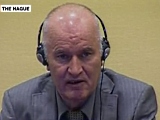The Western Balkans After Mladic
16 Jun 2011
By Plamen Pantev for ISN
On 26 May, Serbian authorities arrested Bosnian Serb General Ratko Mladic – the most wanted military criminal of the post-Yugoslav era – and handed him over to the International Criminal Court (ICC), where he stands accused of genocide, war crimes and crimes against humanity. The long process of bringing justice and reconciliation to Bosnia still lies ahead. In the short term, one doubts whether genuine, mutual forgiveness can come. But bringing to light the truth of what happened to the people of this country is a much-needed step in the right direction.
Just as it would be an illusion to blame the 'unfinished business' in the western Balkans entirely on the delayed arrest of the Serbian general, still considered a hero by many Serbs, it would be a similar mistake to expect that now with his arrest the time has come to accelerate the integration of Serbia and other non-EU states in the region into the Union. Major political obstacles have, in fact, disappeared after the long-awaited arrest, but other important challenges remain. One of the most important is the recognition of Kosovo.
Currently, five EU states do not recognize Kosovo: Greece, Cyprus, Spain, Slovakia and Romania. In each country the motivation is different – driven by domestic concerns and national politics. With the arrest of Mladic, however, and the new opportunities it promises, the failure of EU member states (for more than three years now) to recognize the independence of Kosovo is becoming a new 'problem area' with troubling implications for the stability of the region.
Though Kosovo's ambitions to statehood are widely supported – by the US, Canada and Japan, as well as by 75 of the 192 UN members, 22 of the 27 EU members, and 24 of the 28 NATO parties – its efforts are often paralyzed by this inability of the EU to speak with one voice in its own backyard.
Moreover, lingering doubts about the legitimacy of the new state, situated in the very heart of the western Balkans, diminish its ability to develop strong bilateral relations with the other states of southeast Europe, as such efforts are generally perceived as threats in Belgrade and in the capitals of the five EU states that still withhold recognition.
A Kosovo that is only partially recognized will remain a bitter problem for regional security in southeast Europe as long as the efforts of the young state and its international supporters for more complete independence are frustrated and delayed. To make matters worse, other existing issues will be further polarized by the lack of a common EU stance.
The non- recognition of Kosovo also represents another failure of the EU Common Foreign and Security Policy (CFSP) – in a region where the Union and its transatlantic allies have already invested so much.
The intransigent positions of the five non-recognizing EU states stand in stark contrast to the attitudes of the majority of the Union toward Kosovo. Even if Serbia itself were to accelerate its bilateral negotiations with Kosovo – now a genuine possibility after the new impetus given to EU-Serbian relations by the arrest of Mladic – the lack of a unified EU CFSP would remain a great source of tension.

